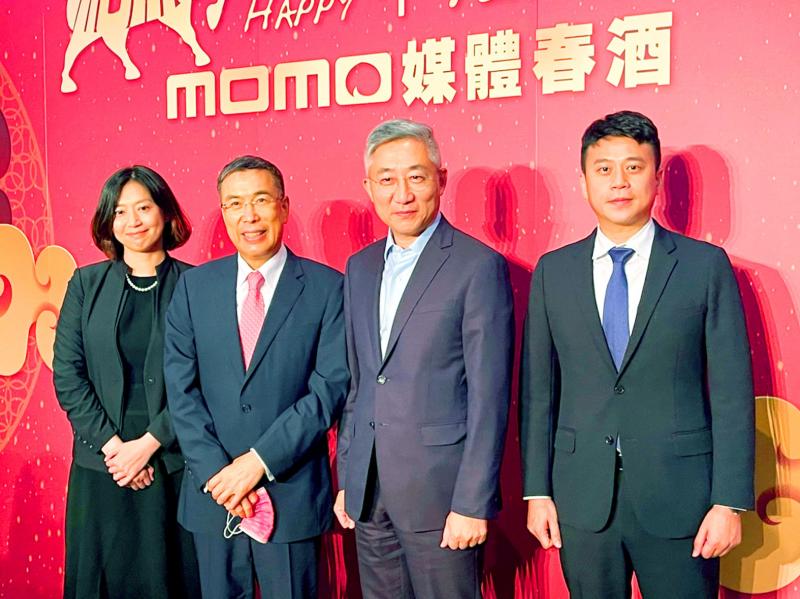E-commerce operator Momo.com Inc (富邦媒體) on Tuesday announced the construction of 10 satellite warehouses and a logistics center in southern Taiwan.
The infrastructure upgrades would help to lower costs and shorten shipping times for packages delivered to southern Taiwan, the company said at a media gathering.
“These new logistics upgrades will elevate our ability to deliver all across Taiwan,” Momo chairman Lin Chi-feng (林啟峰) said. “We anticipate the southern logistics center to begin operations in 2023.”

Photo: CNA
The firm launched its subsidiary Fu Sheng Logistics Co (富昇物流) in May last year so that it could operate its own fleet of delivery vehicles.
“We hope to increase the percentage of deliveries completed by Fu Sheng to 15 percent this year,” Lin said.
Northern Taiwan accounts for 60 percent of Momo’s orders, while central and southern Taiwan each account for 20 percent.
However, the company’s main logistics center and warehouse are in the north.
Packages destined for the south are dispatched from the northern logistics center, which is inefficient, the company said.
Momo has benefitted from the shift in consumer behavior driven by the COVID-19 pandemic, as consolidated revenue last year increased 29.65 percent year-on-year to reach a record NT$67.2 billion (US$2.37 billion) from NT$51.83 billion in 2019.
Thanks to improving operational efficiency and economies of scale, net profit last year increased 39.48 percent to NT$1.94 billion from NT$1.39 billion in 2019, with earnings per share rising from NT$9.95 to NT$13.87, company data showed.
On Tuesday, PChome Online Inc (網路家庭) announced that it would launch a share buyback program to reward employees, and proposed distributing a cash dividend of NT$1.3 per share to shareholders, which would represent a payout ratio of 60.19 percent.
PChome Online said that its board of directors approved a plan to buy back 1.5 million shares, or 1.27 percent of its outstanding shares, on the open market for NT$60 to NT$100 per share from yesterday to May 16.
The company added that it plans to reward employees with the repurchased shares over the next five years.
The e-commerce company reported that net profit last year increased 55.63 percent to NT$252.79 million from NT$162.44 million in 2019, with earnings per share increasing to NT$2.16 from NT$1.39.
Revenue last year increased 12.82 percent to a record NT$43.87 billion from NT$38.88 billion in 2019, company data showed.
This year, the company said that it aims to increase its customer base by offering points-based incentives, and to expand offline channels, from large chains to small stores.

UNCERTAINTY: Innolux activated a stringent supply chain management mechanism, as it did during the COVID-19 pandemic, to ensure optimal inventory levels for customers Flat-panel display makers AUO Corp (友達) and Innolux Corp (群創) yesterday said that about 12 to 20 percent of their display business is at risk of potential US tariffs and that they would relocate production or shipment destinations to mitigate the levies’ effects. US tariffs would have a direct impact of US$200 million on AUO’s revenue, company chairman Paul Peng (彭雙浪) told reporters on the sidelines of the Touch Taiwan trade show in Taipei yesterday. That would make up about 12 percent of the company’s overall revenue. To cope with the tariff uncertainty, AUO plans to allocate its production to manufacturing facilities in

TAKING STOCK: A Taiwanese cookware firm in Vietnam urged customers to assess inventory or place orders early so shipments can reach the US while tariffs are paused Taiwanese businesses in Vietnam are exploring alternatives after the White House imposed a 46 percent import duty on Vietnamese goods, following US President Donald Trump’s announcement of “reciprocal” tariffs on the US’ trading partners. Lo Shih-liang (羅世良), chairman of Brico Industry Co (裕茂工業), a Taiwanese company that manufactures cast iron cookware and stove components in Vietnam, said that more than 40 percent of his business was tied to the US market, describing the constant US policy shifts as an emotional roller coaster. “I work during the day and stay up all night watching the news. I’ve been following US news until 3am

COLLABORATION: Given Taiwan’s key position in global supply chains, the US firm is discussing strategies with local partners and clients to deal with global uncertainties Advanced Micro Devices Inc (AMD) yesterday said it is meeting with local ecosystem partners, including Taiwan Semiconductor Manufacturing Co (TSMC, 台積電), to discuss strategies, including long-term manufacturing, to navigate uncertainties such as US tariffs, as Taiwan occupies an important position in global supply chains. AMD chief executive officer Lisa Su (蘇姿丰) told reporters that Taiwan is an important part of the chip designer’s ecosystem and she is discussing with partners and customers in Taiwan to forge strong collaborations on different areas during this critical period. AMD has just become the first artificial-intelligence (AI) server chip customer of TSMC to utilize its advanced

Six years ago, LVMH’s billionaire CEO Bernard Arnault and US President Donald Trump cut the blue ribbon on a factory in rural Texas that would make designer handbags for Louis Vuitton, one of the world’s best-known luxury brands. However, since the high-profile opening, the factory has faced a host of problems limiting production, 11 former Louis Vuitton employees said. The site has consistently ranked among the worst-performing for Louis Vuitton globally, “significantly” underperforming other facilities, said three former Louis Vuitton workers and a senior industry source, who cited internal rankings shared with staff. The plant’s problems — which have not